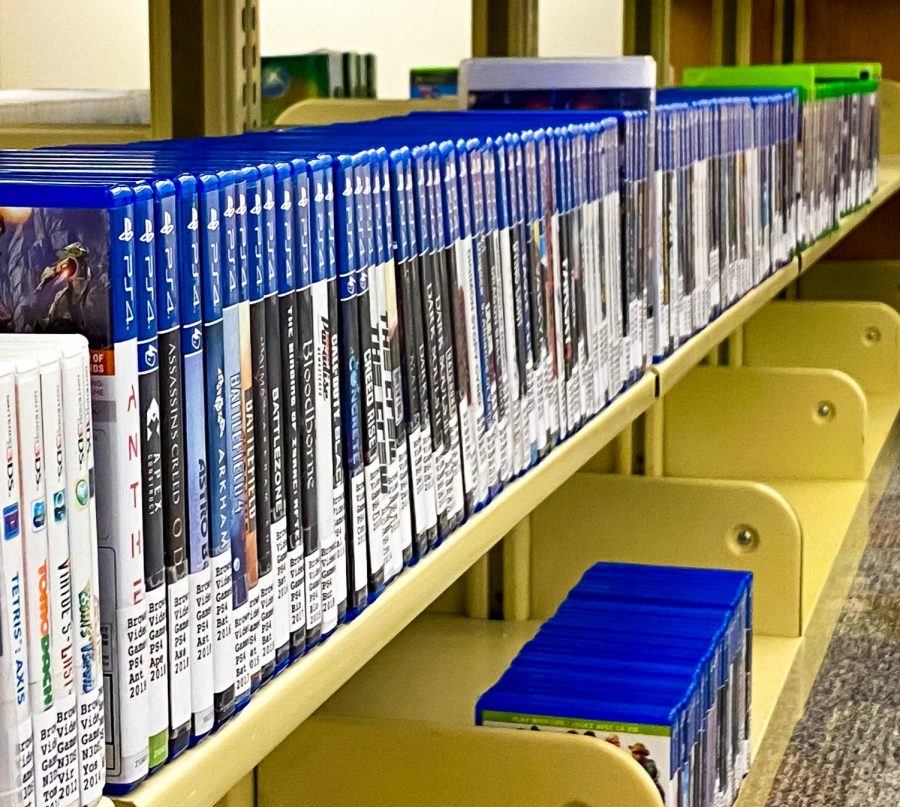Gaming culture appreciation drives popularity
UW-Whitewater’s Andersen Library promotes gaming culture by offering a variety of different video games for every gaming system. Students are able to check out any video game and system from the library, and play right in the comfort of their own dorm.
November 8, 2020
When most people win in a video game they feel happiness and pride with winning. However, there is a large population of people who find video games to be one of their favorite pastimes, or even a part of their livelihood. This week at Whitewater we’re taking an inside look at gaming culture and the community.
First to speak on how video game culture has affected them positively is sophomore media art and game development major Dalon Williams.
“I’ve always loved art, specifically in games. I’ve been a gamer my entire life and it’s something that has brought me calmness and good well-being. I wanted to major in something that made me happy and also I can make a living out of. If it can’t do both, I won’t do it. I wanted to be someone that could create video games that make other people happy like it does for me. I believe it’s also coming into a new era of therapy,” says Williams.
Williams brings up something that has become a trending topic in the gaming world. Some think video games can have the effects of catharsis, which can be used as a therapy. In games you can release all your “high” emotions: the happiness, the excitement, the surprise, as well as the “low” emotions of sadness, disappointment and rage. Storytelling choice games are the best example of this situation. The games often use the “butterfly effect” theory, where the player gets to make choices, and every choice they make will affect the gameplay, as well as the outcome. For example, if they take too long solving a puzzle they may inevitably lose a key character to the story.
“When you think of culture, you think of music, movies and books. People use those to escape to another world and video games take that to a whole new level. It allows you to interact with said world. Another thing that makes the culture is the community, within the past ten years we’ve seen a huge upsurge of content creators on social media platforms creating ‘Let’s Plays’ or even ‘Battle Royales’,” says junior Video Game Club president Jacob Niemuth.
Niemuth, an electronic media major, brought up something he falls into often: ‘The Tetris Effect.’ This is where you get lost in the game, and nothing is around you mentally: just you and the means for survival. These kinds of terminology are common among people that are interested in all aspects of game design, the development process, or just a general member of the gaming community. Sometimes there are more not-so-fun parts of the gaming community as well.
“Some members of the various individual game communities can get defensive or toxic if something doesn’t go the way they want it to. While it’s typically easy to find someone who wants to play with you, no matter how good you are, because of the community’s size, these things can lead to social media platform wars or fights,” says freshman international business major Jaina Novak.
Many have argued that video games can have a negative impact on younger minds. However, all of these sources explain that really everyone just needs to be responsible when consuming any media – especially if it’s mature material. The ESRB ratings are used in all forms of media such as for R-rated films, albums with parental advisory stamps, and E for everyone games.
Gaming is so popular today it is used for far more than entertainment. Many are turning games into careers.
“People can take this chance to be hardworking,” says Williams. “They go into esports, go into competitions, get jobs teaching the game development process, and so much more. I’ve always had thoughts of working for the game developer, Behaviour Interactive, who produces one of my favorite games. Anyone can do it!”











